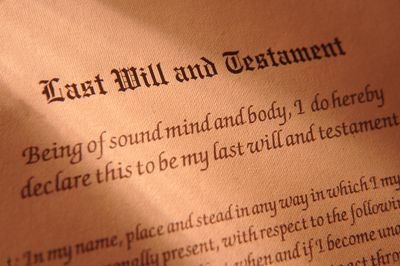Estate Planning – Documents I Should Provide My Attorney
Cleveland, Ohio, estate planning lawyer, Daniel A. Baron, Ohio, offers the following information on what documents are necessary for you to provide your attorney when sitting down to establish your comprehensive estate plan.
“Be prepared.” Boy Scouts of America
A recent survey taken by the AARP found that 3 out of every 5 Americans have no estate-planning documents, not even a simple will. Thus, money and assets they’ve spent a lifetime earning and saving are at risk from creditors, litigation, and state and federal taxation. Further, none of their friends or family know how to handle their affairs or last wishes. Even though the majority of people have not taken the necessary steps to formulate a plan when the inevitable comes, all can agree that leaving friends and family to scramble to pay your debts, settle your accounts, and divide your worldly possessions is not the best way. A time of mourning should be just that, for mourning, not for calling bankers, insurance agents, or accountants.
Hopefully, you’ve decided to take the first step and enter into the minority of Americans who proactively address what is left behind when they pass. However, a familiar question exists, how do I get started? That is, what do I need to start planning my estate?
Most, if not all, lawyers are traditional, they like things they can touch and read. So, before you meet with your attorney to plan your estate, you’re going to want to bring a few things. The following list is by no means exhaustive but will give you a good start. Collecting these documents before your meeting will save everyone time, allow your attorney to better comprehend your personal estate planning needs, and prepare you mentally so you can better communicate what you want and what your family needs out of your estate plan.
A General Accounting of your Estate
The word estate is a term that denotes all of the money, property, and debts owned by person, particularly at death. Naturally in order to plan an estate, it must be known what an estate actually encompasses. Therefore, on a piece of paper or computer spreadsheet, your going to write out your estate.
List out: your taxable accounts, your retirement accounts, any life insurance policies, any annuities, your personal residence, other real estate, any highly significant personal property (cars, furniture, artwork, jewelry, etc.), business interests, and any outstanding debts, liabilities, or obligations. For each category, split them up between those owned solely by you, those owned solely by your spouse (if married or part of a civil union), and those owned jointly.
This information is critical for tax projections and allows your attorney to take the necessary steps now, or at death, to ensure that the most property and money goes to where you want and not lost via government taxation, creditors, or litigation. There is a multitude of ways your attorney ensures estate preservation, however, knowing exactly what you have and what you want to do with it is critical. Note that this list only serves as an estimate of your estate, not an exact accounting. Your attorney will be able to advise and guide you on obtaining an accurate picture of your entire estate but this list will be the foundation for future calculations.
Life Insurance Policies
Life insurance is a common tool people use to guarantee their surviving family won’t be left in an untenable financial position in the event of death. The lump sum that life insurance proceeds guarantee can fill critical gaps in an estate plan and ensure that your loved ones are taken care of and your affairs are handled in a respectable manner. This is only possible, however, if the proper beneficiaries are designated. If not, who knows how your proceeds are spent. Therefore, ensuring the proper beneficiaries are denoted and/or updated on your insurance policies is of utmost importance. Make sure to have your attorney review your beneficiaries and file any change of beneficiary forms you desire.
Of further note for seniors, some life insurance policies, such as whole life or universal, accrue cash value which may affect Medicaid eligibility. The accumulation of cash value under particular life insurance policies counts as an asset, which if exceeds $2,000 may disqualify a person from Medicaid. Again, this is something to bring to your attorney’s attention so your estate plan can be more personalized to your needs.
Additionally, life insurance policies are often part of your taxable estate. As such, proper steps during estate planning must be undertaken to lower or avoid the tax burden on the estate. Named beneficiaries of life insurance proceeds may also face significant tax consequences from a sudden influx of cash. As such, bringing your life insurance policies to your estate attorney allows him to understand the type of insurance you possess and avoid issues with regard to beneficiary designations, Medicaid eligibility, and estate tax consequences.
Investment Portfolio
You’re also going to bring your investment portfolio to your attorney. That is, anything evidencing your 401k, owned annuities, stocks, bonds, or mutual funds, and other retirement accounts such as IRAs and Roth IRAs, regardless of whether the IRS classifies them as qualified or unqualified plans. Your investment portfolio is likely a major asset that is a significant part of your taxable estate and whose constituent parts each often have their own special rules regarding contributions, distributions, transfers, and inheritance. Bringing your investment documents to your attorney will allow him to plan your estate accordingly and inform you of the special rules, privileges, and schedules applicable to the particular investment instruments you’ve chosen.
A List of Important Property with Bequests
Generally, this is what most people think of when talking estate planning, who gets the house and who gets grandma’s heirloom necklace. In order to avoid any conflict and confusion between surviving family members over who gets what when you pass, write out a list of the biggest and most important bequests of personal and real property.
Most people list out vehicles, real estate, business interests, family heirlooms, expensive electronics, art work, etc. Pretty much anything that has high sentimental or financial value. Obviously for each item on the list write who gets what and in what way. For simple property, like jewelry, usually an individual gets a direct bequest and the item is theirs when you pass. For other property, such as real estate or business interests, usually these are split up in particular ways. For example, a business being split equally between surviving children or a house passing only to children of a first marriage. Your attorney will inform you of the multitude of ways bequests may be structured in order to satisfy your particular estate planning needs.
Thinking about and writing out your property bequests ensures your final wishes are followed and avoids familial infighting. On top of bringing this list to your attorney, bring any deeds, titles, or other ownership documents. This will expedite an estate accounting after your death for your executor and makes sure you actually own what you think you do. Far too many times families are taken by surprise by a faulty title or hidden lien or claimant on a deed. Your attorney can easily check a chain of title or confirm the validity of a deed and avoid any question of ownership down the line.
A “Managed Care Plan”
This is not to be confused with the private insurance plan you sign up for, or Ohio picks for you, when you apply and are approved for Medicaid. Managed care plans within the context of Medicaid private insurance isn’t the subject here, however, it is an important subject that should be discussed and planned for with your attorney.
Within this context, your managed care plan means a coherent idea of where and how you want to spend the last years of your life, especially in the event of deteriorating health or debilitating disease. That is, the logistics, finances, and questions surrounding issues of hospice care, managed care facilities, nursing homes, and general living as one advances in age.
For example, planning out your senior living situation will likely enable you to stay with your primary care physician and specialists longer. Often the accessibility of physicians and medical specialists are subject to geographic restriction, insurance coverage, or out-of-pocket cost. A proper estate plan can guarantee the funds exist to support continued care in the manner you’ve grown accustomed to and communicate to friends and family your medical wishes far in advance of when those questions arise. Never underestimate the value of spending the autumn of your years in clean and comfortable healthcare facilities with treatment from doctors that have an established relationship. As such, bring any contracts, agreements, or marketing materials of any health or senior living facilities you wish to go to. Every piece of information allows further personalization of your estate plan and more clearly communicates what you want to your family many years down the road.
Further, bring important legal documents such as designations for durable, health, or financial powers of attorney, any do not resuscitate orders (DNRs), and executor and administrator elections. If you don’t have any of these documents prepared, these can easily be drafted by your attorney during your estate planning.
Americans are living longer than ever before and having a plan to confront advancing age is important to ensure comfortable living and piece of mind for the family. Granted this is not an enjoyable or fun aspect of life to think about and plan out, but it is something you and your family will never regret.
Conclusion:
Bringing the listed documents and gathering up your thoughts according to the issues highlighted will give you a good head start in preparation to planning your estate with your attorney. Again, this list is not exhaustive and only touches on a fraction of the issues that addressed during estate planning. Major issues such as surviving spousal support and guardianship of minor children, among many others, must be handled too, so think about these issues as well. Estate planning is a complex process but taking a little time to gather documents and think about the future will pay big dividends to you while you’re here and make life much easier for your family when you’re not.
You don’t have to be rich to protect what you’ve spent a lifetime trying to build. To find out whether a trust is right for your family, take the one-minute questionnaire at www.DoIneedaTrust.com. There are a number of different trusts available and the choices are infinite. With every scenario, careful consideration of every trust planning strategy should be considered for the maximum asset protection and tax savings.
For more information, you can contact Dan A. Baron of Baron Law LLC at 216-573-3723. Baron Law LLC is a Cleveland, Ohio area law firm focusing on estate planning and elder law. Dan can also be reached at dan@baronlawcleveland.com.
Helping You and Your Loved Ones Plan for the Future.
About the author: Mike E. Benjamin, Esq.
Mike is a contracted attorney at Baron Law LLC who specializes in civil litigation, estate planning, and probate law. He is a member of the Westshore Bar Association, the Ohio State Bar Association, the Cleveland Metropolitan Bar Association, and the Federal Bar Association for the Northern District of Ohio. He can be reached at mike@baronlawcleveland.com.











